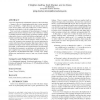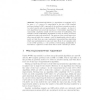139 search results - page 15 / 28 » Reducibilities Relating to Schnorr Randomness |
93
Voted
SIGCOMM
2006
ACM
15 years 6 months ago
2006
ACM
A pervasive requirement of distributed systems is to deal with churn — change in the set of participating nodes due to joins, graceful leaves, and failures. A high churn rate ca...
93
Voted
ICFP
2002
ACM
16 years 18 days ago
2002
ACM
Generational collection has improved the efficiency of garbage collection in fast-allocating programs by focusing on collecting young garbage, but has done little to reduce the co...
102
Voted
CN
1998
15 years 10 days ago
1998
We consider two schemes for the distributionof Web documents. In the first scheme the sender repeatedly transmits the Web document into a multicast address, and receivers asynchr...
113
Voted
STACS
2005
Springer
15 years 6 months ago
2005
Springer
Exponential algorithms, i.e. algorithms of complexity O(cn ) for some c > 1, seem to be unavoidable in the case of NP-complete problems (unless P=NP), especially if the problem ...
93
Voted
ICML
2010
IEEE
15 years 1 months ago
2010
IEEE
Markov logic networks (MLNs) use firstorder formulas to define features of Markov networks. Current MLN structure learners can only learn short clauses (4-5 literals) due to extre...


